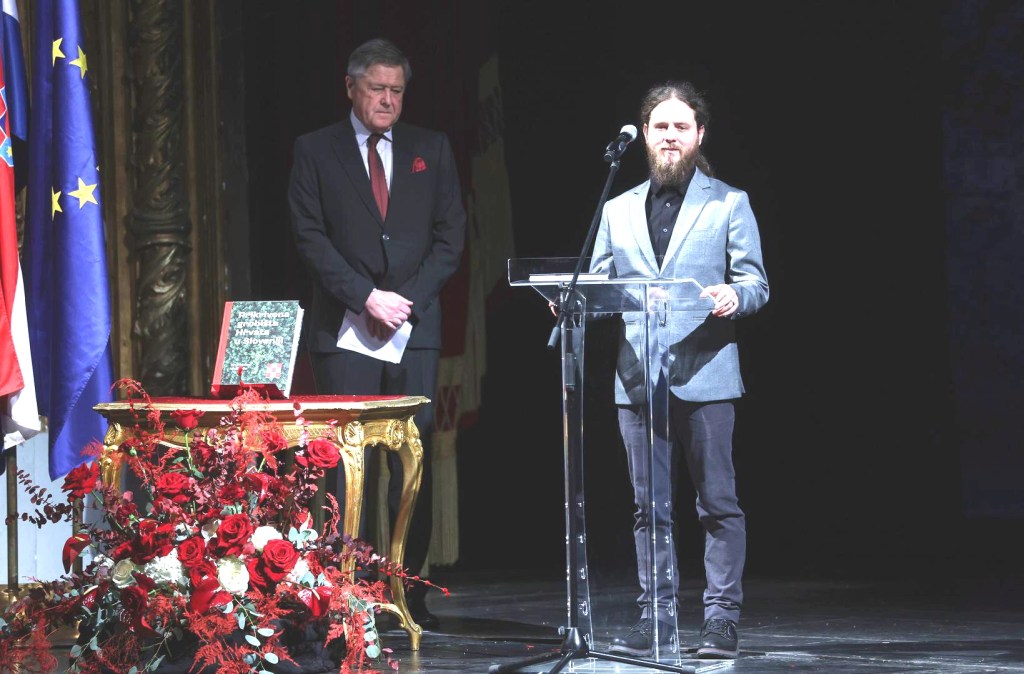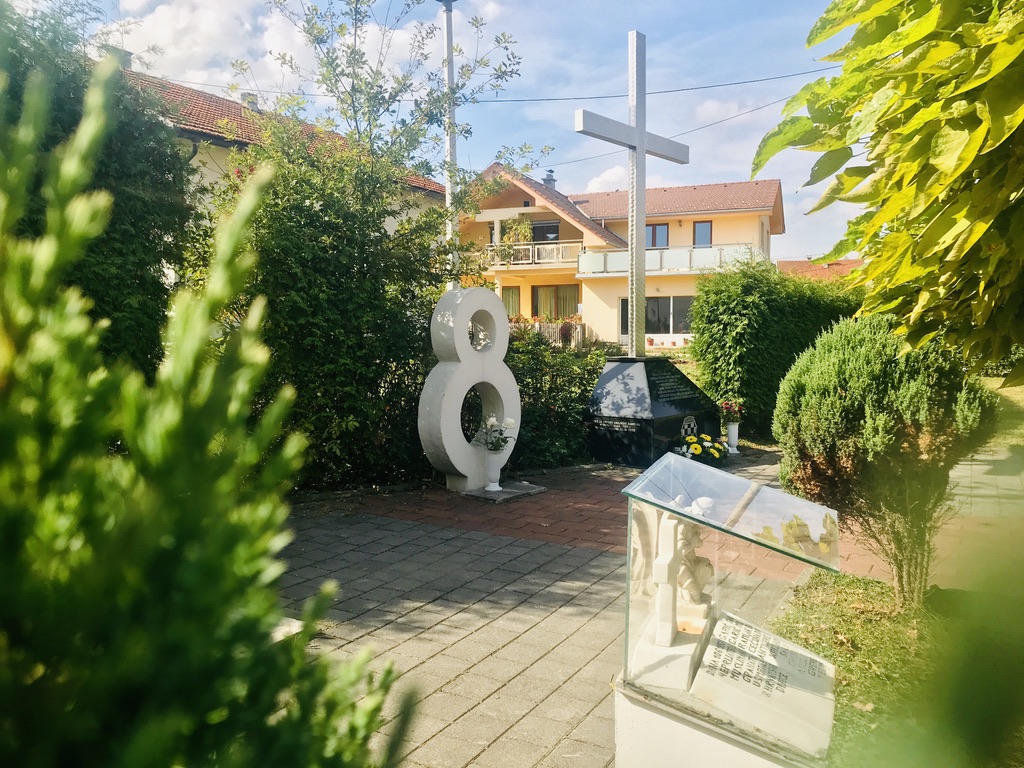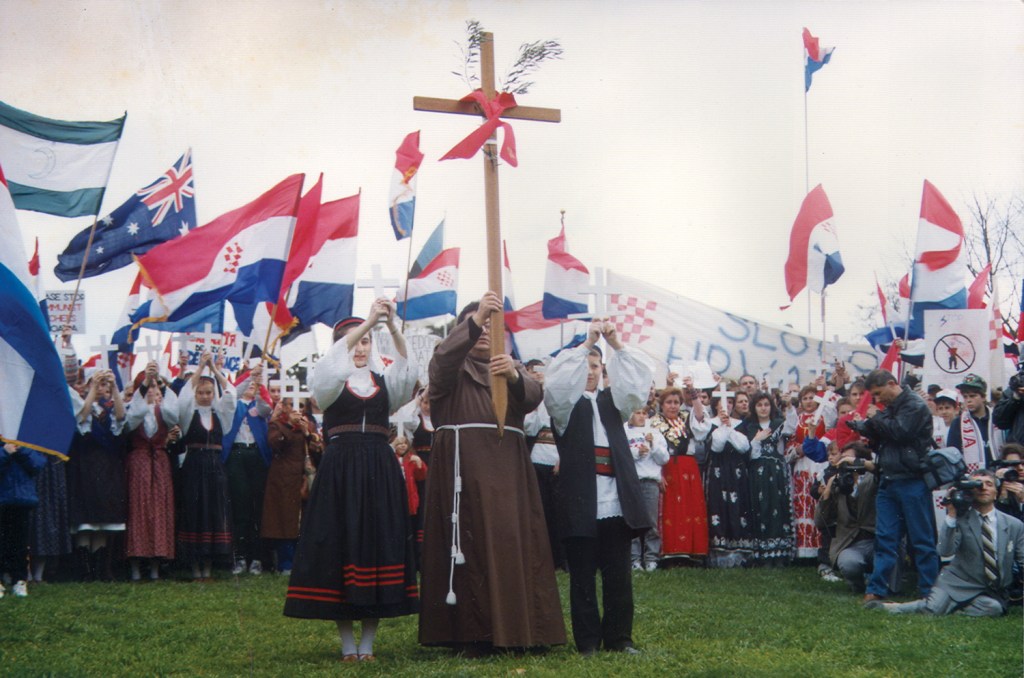
Center: Zeljko Sacic
PHOTO: Screenshot
The recently increased Croatian border control/protection activities and the mainstream media’s focus on scuffles and clashes between migrants and Bosnian police draw the attention to a much bigger problem and issue hovering over the world, not just Croatia. That issue appears to be laced with the fact that the focus on illegal migration remains but the original goal of stopping African, Syrian, Iraqi, Afghanistan … citizens from migrating into Europe appears to have been lost entirely. The so-called Marrakesh Declaration on migration collaboration, signed by 31 European and 26 African countries on 2 May 2018 as part of what is known as the Rabat Process of Euro-African Dialogue on Migration and Development, pronounces African (Syrian, Iraqi, Afghan…) legal migration to be a positive thing, even stressing the beneficial idea of migration of certain groups, such as researchers and business people (to create jobs!). Formal adoption of the Marrakesh agreement is expected in December 2018 during a conference in Marrakesh, Morocco.
Many people who oppose mass immigration into Europe are suspicious that the Marrakesh Declaration heralds a new sustained wave of immigration into Europe. And, judging by the real implications of the Declaration, Croatia is likely to become a migration hot spot.
The Hungarian government appears to be the only government that considers whether the citizens it was elected to serve would support the declaration. Croatian government as well as the President appear to think that asking their electorates what they think about the Marrakesh Declaration and African migration into Europe/Croatia is irrelevant. Hungary was the only EU country that refused signing the declaration, citing threats to security and saying the agreement was “in conflict with common sense and also with the intent to restore European security.” Hungary joined the United States as one of two United Nations members that are not committing to the worldwide migration collaboration agreement, the first of its kind to lay out international standards for countries to address migration.
This Global Compact for Migration (of which the so-called Marrakesh declaration is a part of) is the first-ever UN global agreement on a common approach to international migration in all its dimensions. The global compact is currently non-legally binding, however, once agreements are signed by the participating countries it is more than likely to become legally binding. It is grounded in values of state sovereignty, responsibility-sharing, non-discrimination, and human rights, and recognises that a cooperative approach is needed to optimise the overall benefits of migration, while addressing its risks and challenges for individuals and communities in countries of origin, transit and destination.
The global compact comprises 23 objectives for better managing migration at local, national, regional and global levels. The UN maintains that the compact:
• aims to mitigate the adverse drivers and structural factors that hinder people from building and maintaining sustainable livelihoods in their countries of origin;
• intends to reduce the risks and vulnerabilities migrants face at different stages of migration by respecting, protecting and fulfilling their human rights and providing them with care and assistance;
• seeks to address the legitimate concerns of states and communities, while recognising that societies are undergoing demographic, economic, social and environmental changes at different scales that may have implications for and result from migration;
• strives to create conducive conditions that enable all migrants to enrich our societies through their human, economic and social capacities, and thus facilitate their contributions to sustainable development at the local, national, regional and global levels”.
While the United Nations says the accord is intended to preserve the human rights of all migrants by offering a framework for national governments devising their own policies on migration, the Hungarian government representatives maintain that the accord does not address the fundamental human rights of people who want nothing else than to be able to live in peace and security in their own homelands.
Caution is being felt even from leaders of some participating countries who are currently espousing views and implementing policies that go against the Declaration’s spirit. In Denmark, for instance, the government has decided to single out children in ghettos, in neighbourhoods with high proportion of immigrants by requiring them to learn about Danish culture and Christmas, religious traditions. In Italy, foreign minister Enzo Moavero had threatened to close off his country’s ports to EU ships carrying rescued migrants while anti-immigrant mood in Italy continually escalates. Austria’s coalition government has unveiled plans to cut benefit payments for immigrants, including refugees, in a move aimed at deterring new arrivals as well as proposing a ban on headscarves for girls aged under 10 in schools.
With escalating tension from illegal migrants attempting to cross the Croatian border from Serbia and Bosnia and Herzegovina during the past several weeks especially, where hundreds of refugees that had been involved in the clashes with border police did not pull back and instead decided to spend the night in the open air, camped out in tents and makeshift shelters. The situation is reminiscent – albeit currently on a lower scale – of one seen a few years ago on the border between Serbia and Hungary, at the apex of the migration crisis along the ‘Balkan route’.
On Wednesday 24 October 2018 evening, Croatian president Kolinda Grabar-Kitarovic met in Zagreb with Interior Minister Davor Bozinovic, with whom she discussed the tense situation along the border. The minister ensured her that the police had the situation under complete control and that they were prepared to intervene to stop acts of violence and attempts to illegally enter Croatia. Thousands of migrants, including families, have been staying in north-western Bosnia and Herzegovina — many camping out in the open — while trying, often with force and aggression, to cross into Croatia and journey onward to other EU countries.
Member of Croatian Parliament Hrvoje Zekanovic, Zeljko Sacic (Action for a better Croatia party) and representatives from Associations that emerged after the Homeland War have held a press conference this week at the Croatian border crossing Miljavec, expressing concerns regarding the apparently imminent signing of the Marrakesh agreement in December by the president of Croatia Kolinda Grabar Kitarovic .
“…the key problem here, as General Zeljko Sacic said, is that our president intends to sign on 10 December, in Morocco, in Marrakesh, international agreement which has to do with agreement on the liberalisation of migrant movements across the world. I’m sorry to see that the Croatian media has not devoted its attention to this subject while the UN representatives have clearly said that the main reason for the signing of that agreement is the need for workers. In other words, we will soon receive a new call, similar to the one we received a few years ago from Mrs Merkel, Germany: come, you are welcome… President Grabar Kitarovic has stated she will sign the agreement and that is impermissible to us here…This is not just a drop in the ocean, that is, we fear that in the coming period of time we will have increasingly larger waves of migrants …the UN itself has recently said that there are about 250 million migrants waiting to head for Europe …I want to accentuate here that both Slovenia and Hungary are in the Schengen Zone and Croatia is not. Someone has permitted Slovenia and Hungary to raise barbed-wire fences, to be impermeable, Croatia is permeable and today we have an absurd situation where we are member of the EU but not the Schengen Zone and tomorrow we will be exactly in the place, the furthest place migrants can come to because Slovenia’s and Hungary’s borders are impermeable. I fear Croatia will turn into a hot spot and we see no serious decisions from the Croatian institutions, we see only silence, and I fear that the signature in Morocco will escalate this situation.”
Zeljko Sacic has called in for the Croatian army to defend its borders. “All the politicians in Croatia cannot allow that that there is only five or six thousand border police force members at the borders. Situations like these are beyond their capabilities. The border must be protected using all legally available resources, and one of these is the army,” Sacic said. He also confirmed that they came to the border crossing at the invitation of people living there.
The liberally biased mainstream media in Croatia has mainly ignored the concerns expressed at this press conference and it is unacceptable in a democracy that people are in effect denied information about the implications for their own lives and living the Marrakesh agreement brings. The wording of the Rabat Process documents focuses on sustainability and collaboration but the result has been mass African migration into Europe particularly through Italy. The wars in Afghanistan and Iraq, the war in Syria and fall of Libya have resulted in more migrants that enter via Greece, and these in particular find themselves moving through Croatia or being stopped at the borders. These have been called refugees seeking asylum but have more often been economic migrants seeking a higher standard of living.
Whether the Marrakesh agreement, once signed and adopted in December, will actually legitimise efforts of multiculturalism as tool for peaceful existence or become the engineered, steered machine of a new invasion of Europe, which, by the way, is a widely spread grave concern that prevails in many European circles, is at this point anyone’s guess. One thing seems certain, though: mass immigration is incompatible with even the most generous of social programmes and Croatia is far from having a generated sustainable income for its social welfare and pension program. And this has the capacity of creating unrest and intolerance. Ina Vukic








Leave a reply to inavukic Cancel reply